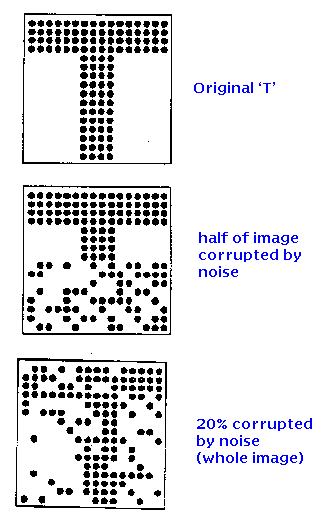
`Remembering' something in common parlance usually consists of associating something with a sensory cue. For example, someone may say something, like the name of a celebrity, and we immediately recall a chain of events or some experience related to the celebrity - we may have seen them on TV recently for example. Or, we may see a picture of a place visited in our childhood and the image recalls memories of the time. The sense of smell (olfaction) is known to be especially evocative in this way.
On a more mundane level, but still in the same category, we may be presented with a partially obliterated letter, or one seen through a window when it is raining (letter + noise) and go on to recognise the letter.
slide of `T's

The common paradigm here may be described as follows. There is some underlying collection of data which is ordered and interrelated in some way and which is stored in memory. The data may be thought of, therefore, as forming a stored pattern. In the recollection examples above, it is the cluster of memories associated with the celebrity or the phase in childhood. In the case of character recognition, it is the parts of the letter (pixels) whose arrangement is determined by an archetypal version of the letter. When part of the pattern of data is presented in the form of a sensory cue, the rest of the pattern (memory) is recalled or associated with it. Notice that it often doesn't matter which part of the pattern is used as the cue, the whole pattern is always restored.
Conventional computers (von Neumann machines) can perform this function in a very limited way. The typical software for this is usually referred to as a database. Here, the `sensory cue' is called the key which is to be searched on. For example, the library catalogue is a database which stores the authors, titles, classmarks and data of publication of books and journals. We may search on any one of these discrete items for a catalogue entry by typing the complete item after selecting the correct option from a menu. Suppose now we have only the fragment `ion, Mar' from the full title `Vision, Marr D.'. There is no way that the database can use this fragment of information to even start searching. We don't know if it pertains to the author or the title, and even if we did, we might get titles or authors that start with `ion'. The kind of input to the database has to be very specific and complete.